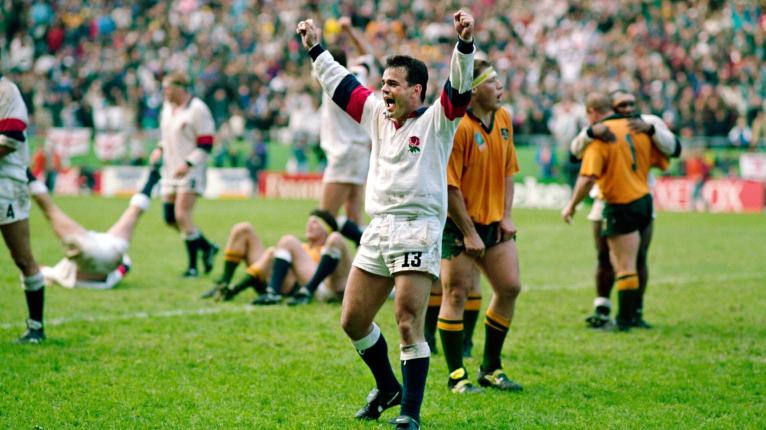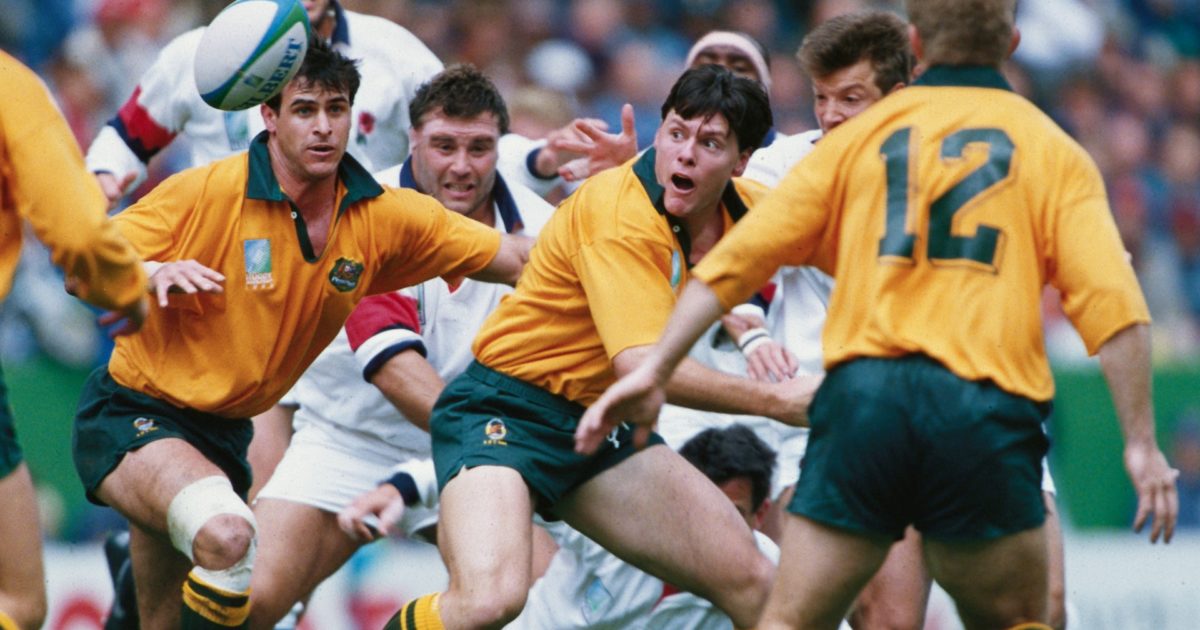Where are they now? The last Australia team of the amateur era 25 years after their exit from the 1995 World Cup

Australia had already tripped up once in the 1995 World Cup pool stages against eventual winners South Africa, but the reigning champions would have approached the June 11 quarter-final game versus England at Newlands brimming with confidence. A backline packed with world-class talent – George Gregan, David Campese, Tim Horan, Michael Lynagh – could pick apart any side.
The match itself 25 years ago didn’t need any added motivation for both sides. England v Australia was enough to stir the juices of even the neutral fan but for England, the scars of 1991 – where Wallaby fans danced with joy after their 12-6 Twickenham final win over Geoff Cooke’s side at the home of English rugby – were still raw.
RugbyPass is not sure if the maxim ‘revenge is a dish best served cold’ translates around the world, but Rob Andrew, with his choirboy looks, had ice in his veins that day and he swept his right foot through the ball to bisect the posts on 82mins 34secs, giving the Wallabies less than a minute to hit back after Andrew had earlier pulled England to 22-22 after 74 minutes.
A perfectly weighted clearance kick from Dewi Morris into touch set off scenes of careless English abandon, with Brian Moore leaping into the arms of support staff.
In truth, England had been the better side in the first-half, with a midfield fumble from Australia giving Tony Underwood the chance to pin his ears back and dot down despite the gallant attempts of Damian Smith to bring him down. A late Lynagh penalty saw the Wallabies going into the sheds seven points in arrears, 13-6.
Whatever coach Bob Dwyer said during the half-time oranges worked because minutes after the restart, Smith, who had perhaps been surprisingly picked ahead of Joe Roff, climbed above three England defenders to roll over the line.
The rest of the second half was increasingly tense, with England’s marauding back row Ben Clarke prominent as the unerring boots of Lynagh and Andrew brought the game to a nerve-jangling crescendo.
The Wallabies went on to play two Bledisloe Cup games that July before the sport officially turned professional that August. What became of their Class of 1995? RugbyPass takes a step back in time:
15. Matt Burke
He was noted as the roundhead to Chris Latham’s cavalier but to pigeon-hole the Sydney-born full-back as a plodding, metronomic points gatherer would be wrong. The full-back scored 29 tries for his country in a brilliant haul of 878 points for the Wallabies. He was key to their series win over the Lions in 2001 and a World Cup winner in 1999, scoring 25 points in the final.
1995 was one of his three World Cup tournament appearances. His try against New Zealand in the Bledisloe in 1996 was a 70-metre wonder try. Latterly in his career he spent five happy years at the Newcastle Falcons playing alongside Jonny Wilkinson. Post-rugby he has been a polished lead anchor for Channel 10 Sports in Australia.
14. Damian Smith
The callow, leggy flyer from Brisbane was one of the lesser known Wallaby backs of the nineties, yet he still ran out in the green and gold on 21 occasions. He scored three tries in South Africa at the 1995 tournament, including a brilliant individual effort against England, outjumping three of their jumpers to crash over. After spending the whole of his career playing for the Queensland South, a broken leg at 31 forced him into early retirement. He now works as a consultant at the Bank of Queensland.
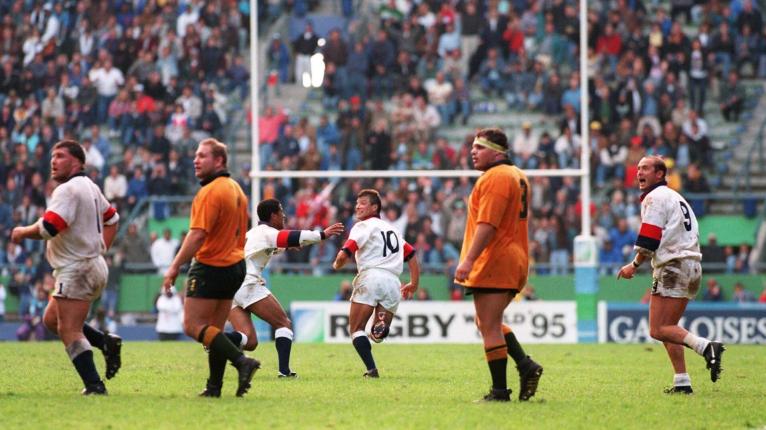
13. Jason Little
The elegant partner of the irascible Tim Horan maybe did not get the credit he deserved playing alongside one of the most celebrated players in the game, but Little played the perfect foil to Horan’s quick footwork and power in contact. The 13 from Toowoomba in Queensland was class personified in his 75 Tests for the Wallabies, scoring 21 tries. With the speed of a wing, an arcing run and power fend, he could exploit his channel adroitly.
A World Cup winner in 1991 and 1999, Little played at three World Cups in the nineties in an eleven-year career on the international stage. A gifted athlete who represented Australia at junior level in athletics and cricket, Little now runs an industrial property development company in North Shore, Sydney. He still catches up for Christmases with the Horan family.
12. Tim Horan
Rated by many as one of the best midfielders ever to grace the game, he was a thorn in many an international side. He scored 30 tries in his 80 Tests for the Wallabies, winning two World Cups in the process. A childhood friend of Little, the two played cricket together and athletics and their bond was noticeable on a Test stage where both players complemented each other.
After overcoming a year-long knee injury in 1994, Horan’s career peak came at the 1999 World Cup, winning player of the tournament before winding his career down in England with Saracens. Since quitting the game in 2003, he has been a part of Fox Sports’ rugby coverage along with other business interests.
11. David Campese
One of the bonafide legends of the game, ‘Campo’ was a divisive mouthpiece for the Wallabies but there was no division over his God-given talent. The Wallaby wing crossed the whitewash on 64 occasions, with only Bryan Habana crossing more for a tier one nation. A master of the step and extremely quick, Campese would beat defenders twice, just for the giggles.
Part of the Grand Slam touring team in 1984, he won a World Cup with the Wallabies in 1991. At club level, he spent eleven years at Randwick before heading to Milan for a pension top-up where he had five fruitful years with Rugby Milano. Often feted as one of the world’s greatest players, his sledging of England became one of rugby’s most entertaining sideshows.
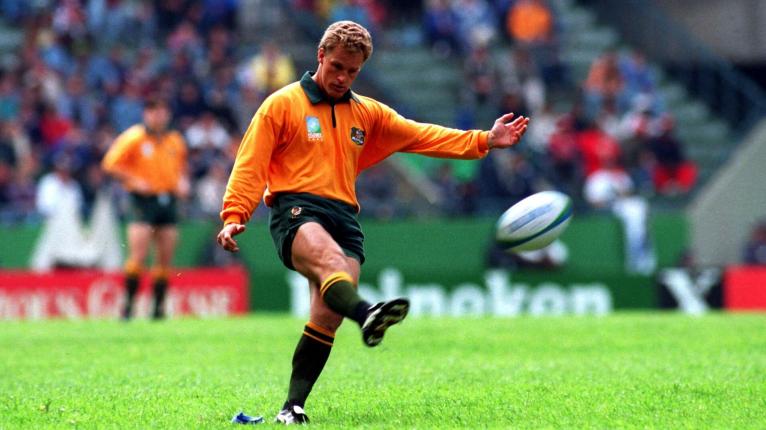
10. Michael Lynagh
The conductor of the orchestra for the Wallabies for over a decade, Lynagh was a thinking man’s 10, a strategist able to unpick the tightest of defences with his deft hands or cultured right-boot. The scorer of 911 points, he was for a time the highest points scorer in world rugby before being overtaken by Messrs Jenkins, Wilkinson and Carter.
After 72 Test appearances, he quit the Test scene and went to London in 1997 after a year with Treviso in Italy to play with Saracens. He never left. He works as a solicitor in the City and has been a Sky Sports pundit for two decades. Lynagh suffered a stroke in 2013 but he pulled through. Hugely respected in both England and Australia.
9. George Gregan
Feted as one of the game’s modern greats, Gregan outlasted all his storied luminaries from the quarter-final, going on to win a then-world record 139 caps over a 13-year Test career. Small, athletic and spiky, he fitted the stereotype of modern-day scrum-half. A brilliant cover tackler, he wasn’t the most prolific of try-scorers with a modest 18 tries, but his leadership, competitive, never-say-die nature typified the glory years of Australian rugby.
A long-term ACT Brumbies player, Gregan was decorated on the domestic stage with two Super Rugby titles. Born in Zambia, with a Zimbabwean mother and Australian father, he moved to Canberra as a young child and post-rugby, coached at the Brumbies and held court as one of Fox Sports’ main commentators. He is also a successful businessman with a series of coffee shops, GG’s Espresso.
1. Dan Crowley
Compared to some of the other players mentioned in this side, Crowley wouldn’t rank as a household name, but he had a 74 per cent win record in a Wallaby Test shirt over a decade, playing 38 times and in three World Cups. A mainstay of the Queensland pack on 124 occasions, his undoubted playing highlight was in 1999 when he saw Australia lift the Webb Ellis trophy in what was to be his final game in the green and gold.
Another player who hailed from Brisbane, Crowley worked as an undercover policeman while playing but in 2012 he had quite a scare after a life-threatening stroke. He recovered and now works in risk mitigation.
'It did turn sour'
Ed Griffiths' behind the scenes insight into the Springboks 1995 #RWC win ??, the back story to the Mandela moment, confronting flag-waving fans, holding clothes hangers for luck & the lost opportunity of it all
– writes @heagneyl https://t.co/XpSHESE4cF
— RugbyPass (@RugbyPass) May 24, 2020
2. Phil Kearns
Rated as one of the best hookers in the world during the nineties, along with Sean Fitzpatrick and Brian Moore, Kearns picked up two World Cups on the way to a highly decorated 67-cap career with the Wallabies in which he was on the winning side 50 times. Muscular and mobile, he had all the physical gifts as well as the technical ones he honed on the paddock at Randwick and the NSW.
Since retiring after the 1999 World Cup, Kearns forged a successful career in TV with Fox Sports where his partisan tones and strident views became part of the rugby furniture in Australia. Beaten by Raelene Castle to the top job at Rugby Australia in 2017, he was one of a number of Wallaby captains to recently voice his disapproval on how the game is currently being run.
3. Ewen McKenzie
Another key member in a halcyon era for Australian rugby, McKenzie was a teak-tough tighthead who picked up a half-century of caps for the Wallabies over seven years. Part of the 1991 World Cup-winning team, McKenzie played on until 1997 when he hung up his boots and went into coaching. A stint as Wallaby assistant coach to Rod Macqueen and Eddie Jones saw him succeeding Bob Dwyer in coaching the Waratahs and he led the Reds to a first Super Rugby title in 2011, working under fellow pack member McCall.
His trajectory took him to the top job as coach of Australia but it was shortlived. In 2014, after just 18 months in the job, he resigned amid off-field controversies. Taking time out of rugby, he has worked as a project chief on Christchurch’s rebuilding after the earthquake and has recently been working on a waste to energy project.
4. Rod McCall
He had 40 Wallaby Tests to his name, starting every one of them. Another Queenslander from Brisbane, McCall was the more muscular member of the engine room duo, adding heft to John Eales’ grace. Friends from childhood with the Brothers Rugby Club, McCall was a partner to Eales for the 1991 World Cup win over England. On a domestic stage, he was stalwart with Queensland and after retirement took over as Reds chairman in 2009.
He spent nearly seven years in the role including 2010 when the Super Rugby title came to the state for the first time. He stepped down in 2016 citing a neck injury from his playing days and was one of ten former Wallaby captains to cite unhappiness with how Rugby Australia was being run earlier this year.
5. John Eales
An icon of Australian sport, Eales was famously – if erroneously – nicknamed ‘Nobody’ because ‘nobody’s perfect’. Despite Dwyer’s experiment playing him at No8, he made his name as a towering, elegant presence in the air where he used every sinew of his 6ft 7in frame to thwart opposing jumpers. A talented cricketer in his youth, Eales was also a gifted kicker off the deck, with 163 points coming from 31 conversions and 34 penalties.
He was also known to slot the odd drop-goal for fun. After captaining Australia on 55 occasions, he retired in 2001 as the world’s most capped lock forward with 81 caps. Since retiring, Eales has made strides in business and is a key protagonist in Australia’s embattled rugby administration. He played all his domestic rugby with the Queensland Reds, winning the Super 10 titles back-to-back in 1994 and 1995.
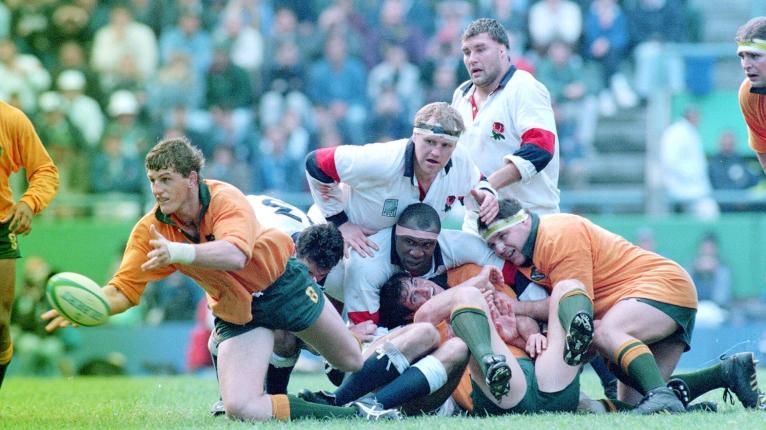
6. Willie Ofahengaue
Big ‘Willie O’ was nicknamed the Tongan Torpedo for his power at the back of the scrum. Standing at 6ft 4ins and over 18st, he was immensely difficult to stop from a short distance. His physical prowess was such that he broke the long-held Manly record by carrying 144 cans of lager (twelve slabs) up the clubhouse stairs. Ofahengaue means ‘love to work’ in Tongan and Willie O toiled magnificently in his 41 appearances for Australia over an eight-year period.
He was a key part of the 1991 World Cup-winning Wallabies, taking a key lineout for Tony Daly’s try – the only try of the game. Now a minister with the Free Wesleyan Church of Tonga just outside Melbourne, he remains one of rugby’s most revered powerhouses. His nephew Joe Ofahengaue is starting to make a name for himself in NRL with the Maroons.
7. David Wilson
While the All Blacks had the riches of Michael Jones and Josh Kronfeld during the nineties, the Wallabies had a more underrated operator at No7 who was no less effective. Wilson made 79 appearances for the Wallabies over eight years, lifting the World Cup in 1999. The openside won regular Bledisloe Cups when the Wallabies could match their cross-Tasman rivals. After the 1999 World Cup, he came to England to play for Harlequins but his career was ended at 35 with a knee injury in 2001. Wilson now works in property development in Sydney, and rugby fans should keep an eye out for his son Harry, who is a 10-15 in the Waratahs Academy.
8. Tim Gavin
Despite playing his rugby in Sydney and attending the prestigious Scots College, the towering Gavin described himself as a ‘bush baby’ and now lives on a sprawling 12,000-acre farm in rural New South Wales growing wheat and cotton. ‘Timmy’ Gavin went on to wear the Wallaby No8 shirt on 47 occasions over an eight-year period, missing the 1991 World Cup through a knee injury.
A fine technician at the tail of the lineout and a shrewd operator in the loose, he was rated as one of the world’s best for many years. A captain for the NSW Waratahs in domestic rugby leading them into their first Super Rugby years, as well as the farming, Gavin has become increasingly involved in administration, moving from president of the New South Wales Union to vice-president of Rugby Australia and finally president last year.
